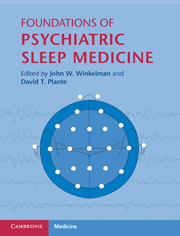Book contents
- Foundations of Psychiatric Sleep Medicine
- Foundations of Psychiatric Sleep Medicine
- Copyright page
- Contents
- Contributors
- Preface
- Editors’ introduction
- Section I Overview
- Section II Normal Sleep
- Section III Principles of Evaluation and Management
- Section IV Primary Sleep Disorders in Psychiatric Contexts
- Section V Insomnia in Psychiatric Contexts
- Section VI Sleep Disturbance in Psychiatric Illness
- Chapter 15 Depressive disorders
- Chapter 16 Bipolar disorder
- Chapter 17 Sleep in anxiety disorders
- Chapter 18 Psychotic disorders
- Chapter 19 Sleep in substance use disorders
- Chapter 20 Sleep in dementias
- Chapter 21 Sleep in attention-deficit/hyperactivity disorder (ADHD)
- Chapter 22 Sleep in pediatric mood and anxiety disorders
- Chapter 23 Sleep in developmental disorders
- Section VII Future Directions
- Index
Chapter 20 - Sleep in dementias
from Section VI - Sleep Disturbance in Psychiatric Illness
Published online by Cambridge University Press: 01 June 2011
- Foundations of Psychiatric Sleep Medicine
- Foundations of Psychiatric Sleep Medicine
- Copyright page
- Contents
- Contributors
- Preface
- Editors’ introduction
- Section I Overview
- Section II Normal Sleep
- Section III Principles of Evaluation and Management
- Section IV Primary Sleep Disorders in Psychiatric Contexts
- Section V Insomnia in Psychiatric Contexts
- Section VI Sleep Disturbance in Psychiatric Illness
- Chapter 15 Depressive disorders
- Chapter 16 Bipolar disorder
- Chapter 17 Sleep in anxiety disorders
- Chapter 18 Psychotic disorders
- Chapter 19 Sleep in substance use disorders
- Chapter 20 Sleep in dementias
- Chapter 21 Sleep in attention-deficit/hyperactivity disorder (ADHD)
- Chapter 22 Sleep in pediatric mood and anxiety disorders
- Chapter 23 Sleep in developmental disorders
- Section VII Future Directions
- Index
Summary
- Type
- Chapter
- Information
- Foundations of Psychiatric Sleep Medicine , pp. 330 - 342Publisher: Cambridge University PressPrint publication year: 2010

